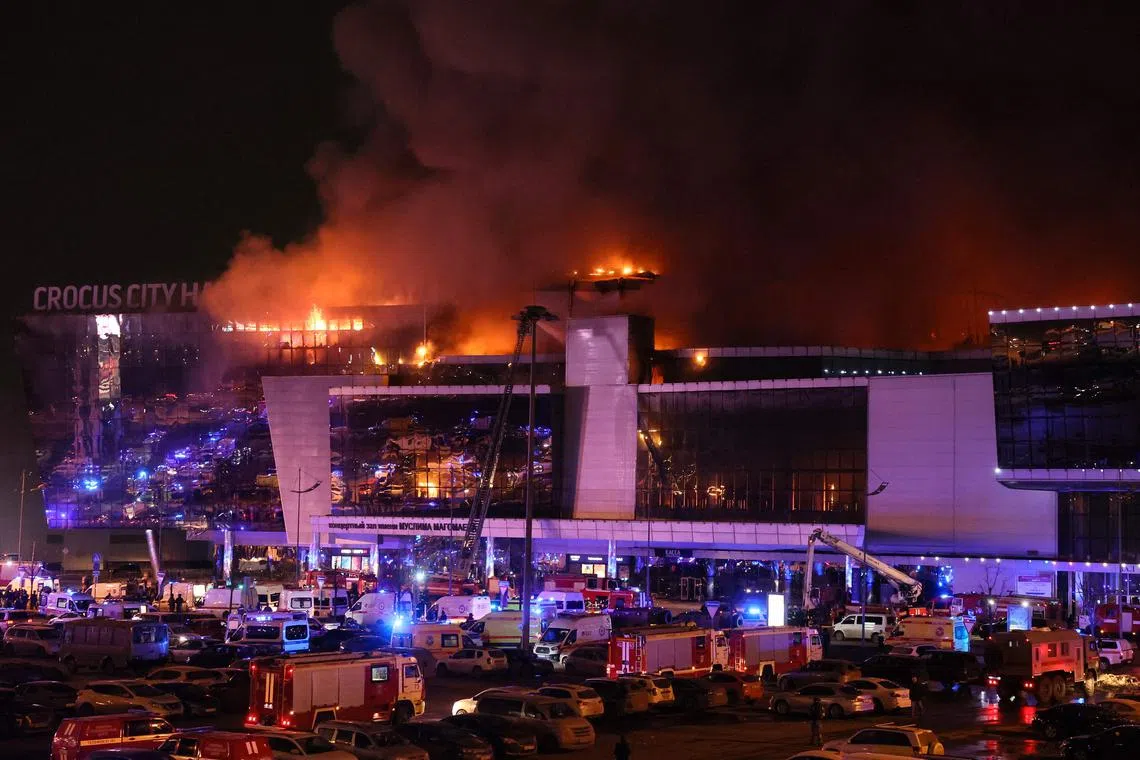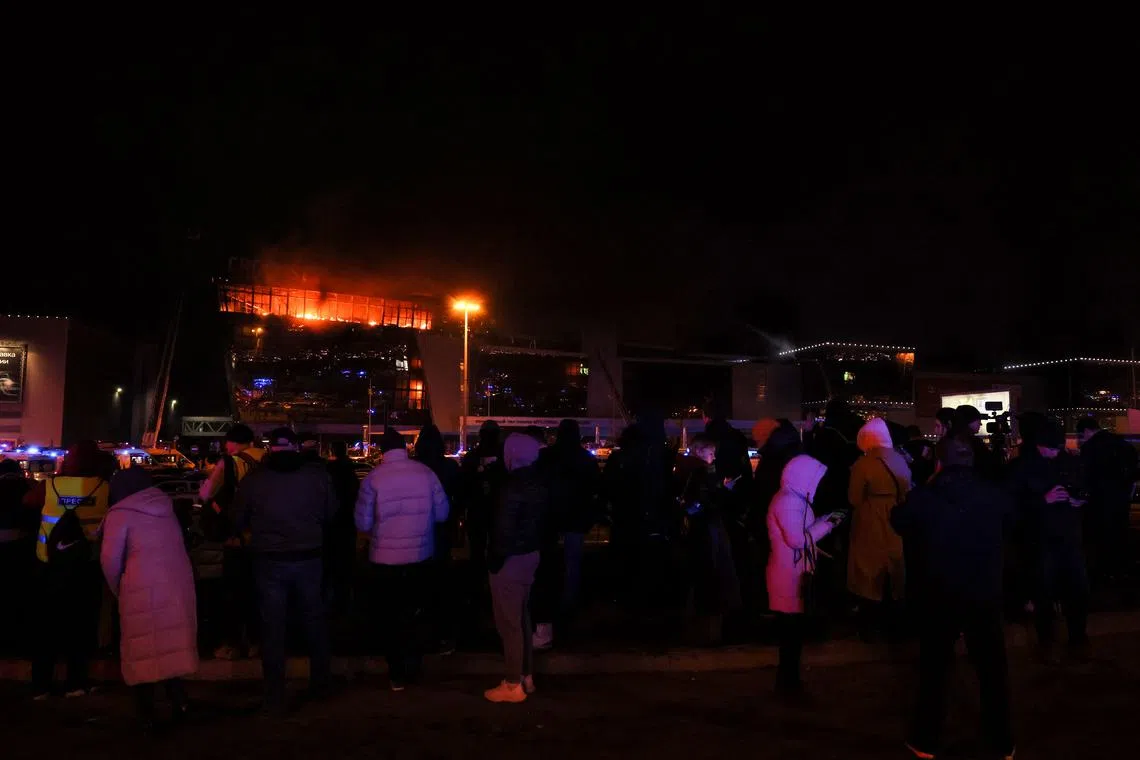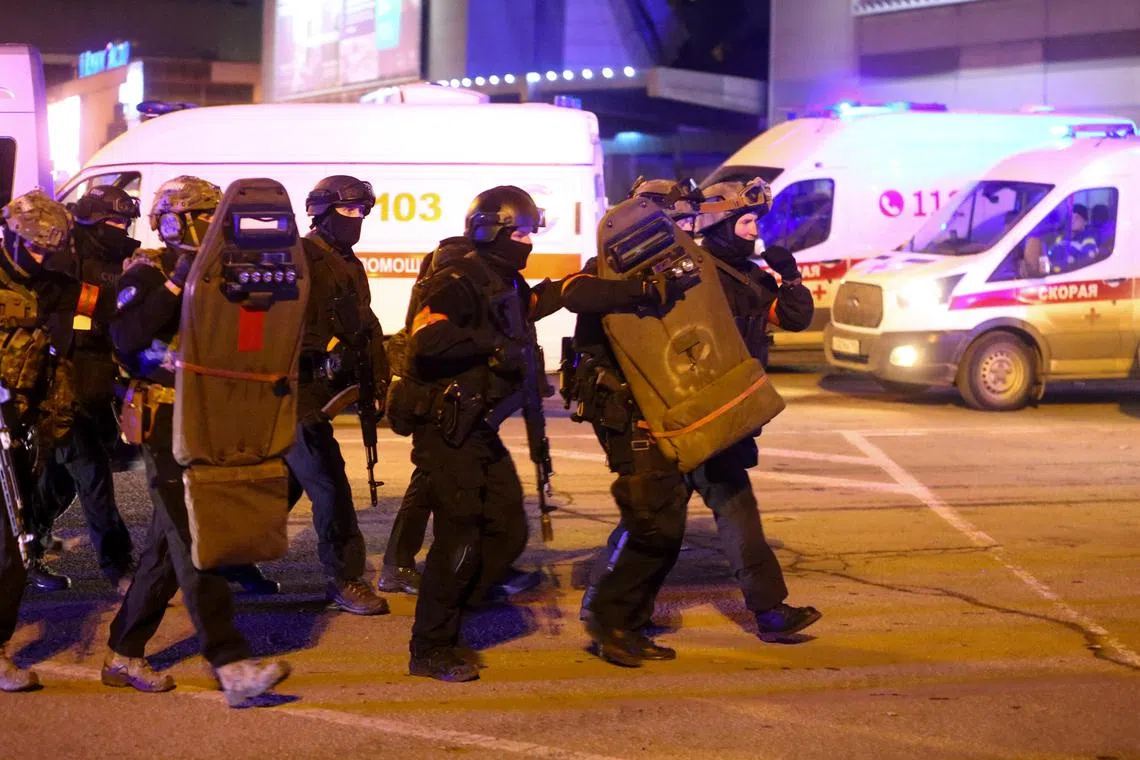Putin vows retribution for Moscow attack that killed more than 140; ISIS claims responsibility
Sign up now: Get ST's newsletters delivered to your inbox
Follow topic:
MOSCOW - Russian President Vladimir Putin on March 23 called the attack on a concert hall that killed more than 143 a “barbaric terrorist act” and vowed harsh retribution to all those involved.
In a televised address, he said all four gunmen had been arrested before they had a chance to cross the border into Ukraine.
“I am speaking to you today in connection with the bloody, barbaric terrorist act, the victims of which were dozens of innocent, peaceful people,” Mr Putin said in his first public remarks since the attack. “All four perpetrators of the terrorist attack who shot and killed people have been detained. They were travelling towards Ukraine where they had a window to cross the border.”
Russian investigators said on March 23 the death toll had risen to more than 143 from an earlier figure of 115.
“While clearing the debris in the Crocus City Hall concert hall, the number killed as a result of the terrorist attack rose... Search operations are continuing,” the Investigative Committee said.
The attack, which saw the concert hall set ablaze, has been claimed by the Islamic State in Iraq and Syria (ISIS) but the Russian authorities have not mentioned this.
“Terrorists, murderers, non-humans will face the unenviable fate of retribution and oblivion,” said Mr Putin, who declared March 24 a day of national mourning across Russia.
The ISIS militant group said on March 23 that four of its fighters carried out the attack.
“The attack was carried out by four (ISIS) fighters armed with machine guns, a pistol, knives and firebombs,” it said on one of its Telegram channels, adding that the attack was part of “the natural context of the raging war” with “countries fighting Islam”.
Russia’s FSB security service on March 23 said it had arrested 11 people – including four gunmen – behind the attack while they were trying to flee to Ukraine, adding that the assailants had “appropriate contacts” in the country.
Kyiv said it rejected Russian claims of a Ukrainian link to the attack on the Moscow concert hall.
“The versions of Russian special services regarding Ukraine are absolutely untenable and absurd,” Mr Mykhaylo Podolyak, an aide to Ukrainian President Volodymyr Zelensky, said in a post on X. He added that Ukraine had “nothing to do” with the attack.
Some Russian lawmakers also pointed to Kyiv, without providing evidence.
“The main interested party could most likely be Ukraine and its patrons... we can’t rule it out,” said senior Russian MP Andrey Kartapolov.
Gunmen in camouflage opened fire on the packed Crocus City Hall in Moscow’s northern suburb of Krasnogorsk on the evening of March 22, ahead of a concert by Soviet-era rock band Piknik, in the deadliest attack in Russia for at least a decade.
Rising death toll
The Investigative Committee, which probes major crimes, said rescue workers were still working on-site, pulling bodies from the building.
“The emergency services have found more bodies while removing the rubble. The death toll now stands at 115 people,” it said in an earlier statement on Telegram.
The number of fatalities was likely to rise further, as the governor of the Moscow region said rescuers would continue to scour the site for “several days”.
Investigators said people died from both gunshot wounds and smoke inhalation after a fire engulfed the 6,000-seater venue.
“The terrorists used a flammable liquid to set fire to the concert hall’s premises, where spectators were located, including the wounded,” the Investigative Committee said.
Flames had quickly spread through the venue on March 22 after reports of the mass shooting, with screaming concertgoers rushing to emergency exits.
Some filmed the gunmen from the upper floors as they appeared to methodically walk through the stalls shooting people, footage shared on social media showed.

Fire quickly spread through the Crocus City in Moscow’s northern Krasnogorsk suburb on March 22.
PHOTO: AFP
Global condemnation
Some 107 people were still in hospital on the morning of March 23, according to Russia’s Emergency Situations Ministry.
In Moscow, residents formed long queues in the morning rain on March 23 to donate blood, according to videos posted by state media outlets. Memorial posters featuring a single candle replaced advertising billboards at some Moscow bus stops, the RIA Novosti state agency reported. Major events were cancelled across the country, including a friendly football match between Russia and Paraguay set to take place in Moscow on March 25.
Statements of condemnation from world leaders continued to roll in. On March 23, a spokesperson for Afghanistan’s Foreign Ministry said the Taliban “condemns in the strongest terms the recent terrorist attack in Moscow... and considers it a blatant violation of all human standards”.
UN human rights chief Volker Turk was “horrified” by the deadly attack, his office said as it called for the perpetrators to be held to account.

People outside the burning concert venue following the shooting.
PHOTO: AFP
US warning dismissed
Attention is also being focused on Russia’s powerful intelligence services in the wake of the attack.
Just three days before, Mr Putin had publicly dismissed Western warnings of an imminent attack in Moscow as propaganda designed to scare Russian citizens.
On March 7, the US Embassy in Russia had issued a security alert, saying it was “monitoring reports that extremists have imminent plans to target large gatherings in Moscow”, including concerts.
Washington said it had directly warned the Russian authorities about a “planned terrorist attack” possibly targeting “large gatherings” in Moscow.
The United States had “shared this information with Russian authorities”, National Security Council spokeswoman Adrienne Watson said.
But speaking to FSB chiefs last week, Mr Putin said: “Recent provocative statements by a number of official Western structures about the possibility of terrorist attacks in Russia... resemble outright blackmail and an intention to intimidate and destabilise our society.”
Earlier in March, the FSB said it had killed ISIS militants who were planning an attack on a Moscow synagogue.
Over recent weeks, the agency has announced on an almost daily basis the arrest of several pro-Ukrainian saboteurs it said were plotting attacks on Russian military infrastructure.

Servicemen from the special operations forces heading towards the Crocus City Hall following the shooting on March 22.
PHOTO: AFP
Singapore’s Ministry of Foreign Affairs said in a statement on March 23 that it “strongly condemns” the terrorist attack that took place at Crocus City Hall.
“This attack is a stark reminder of the threat that terrorism continues to pose to all countries. We extend our condolences to the bereaved families and wish the injured a swift recovery,” the statement said.
It added that there are currently no reports of affected Singaporeans, but advised citizens to defer all non-essential travel to Russia. AFP

